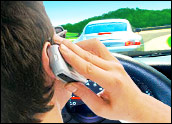
In what may be a first-of-kind study, researchers at the Virginia Tech Transportation Institute have concluded text messaging is just about the most deadly thing you can do behind the wheel of a car.
However, talking on a cellphone isn’t that big a deal, the research suggests.
Virginia Tech’s study, which is based on an analysis of 6 million miles driven under electronic observation, reports the risk of at least coming close to crashing balloons by 2,300 percent when drivers start tapping out text messages.
Dialing a cellphone raises the risk by nearly 300 percent, but once the call is placed, the raised danger of simply having a conversation falls precipitously — to nearly undistracted levels, according to the research.
TechNewsWorld’s telephone calls, emails and text messages to VTTI spokesperson Sherri Box were not returned. A receptionist at the institute’s offices said the organization had been inundated with telephone calls and interview requests following the release of the research.
Real-World Results
The study results are based on information gleaned over 6 million miles of driving by “sophisticated cameras and instrumentation” placed in study participants’ vehicles, according to a press release issued by the institute.
“Given recent catastrophic crash events and disturbing trends, there is an alarming amount of misinformation and confusion regarding cellphone and texting use while behind the wheel of a vehicle,” institute director Tom Dingus said. “The findings from our research at VTTI can help begin to clear up those misconceptions as it is based on real-world driving data.”
Driver-Safety Advocates Not Convinced
However, the research on the dangers of simple cellphone use doesn’t need clearing up, contended Russ Rader, a spokesperson for the Insurance Institute for Highway Safety.
“The research is pretty well established now that the risk of dialing and driving is four times higher than undistracted driving,” he said, citing two studies — one from 1997 and another from 2005 — comparing cellphone records with accident data.
“That research suggests the conversation itself, not just fumbling with and dialing the phone, is responsible for the distraction,” he said.
Other studies using simulators and other methods have found that having a conversation or even listening to an audiobook can sap mental focus from driving, leaving motorists and higher risk of crashing.
The authors of the Virginia Tech study argue such studies are not based on real-world driving, as theirs is, and as such aren’t reliable indicators of what happens in actual traffic.
Little research has been done on the actual dangers of text messaging, according to the Insurance Institute.
The real threat is anything that draws a driver’s eyes away from the road, it maintains.
Texting while moving should be banned entirely, the Insurance Institute recommends, and all cell use should be prohibited for newly licensed teen drivers.
Tech Solution on the Horizon
Technology may provide part of the solution to the problem.
At least one company, Aegis Mobility, has come up with a system that uses modern phones’ geolocating capabilities to determine when a phone is in motion and shut down its ability to make calls or send text messages, except for 911.





















































I commute on a motorcycle and from what I have seen drivers who do anything in there car besides drive are distracted! I have been riding for 35 years and it gets worse every year with every new toy to distract drivers!